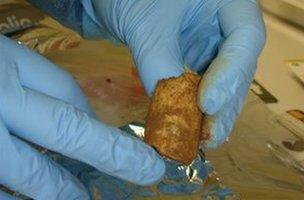Neanderthal family found cannibalised in cave in Spain
- Published

Archaeologists excavate the cave in El Sidron in Asturias, northern Spain
Archaeologists in Spain have unearthed the remains of a possible family of 12 Neanderthals who were killed 49,000 years ago.
Markings on the bones show the unmistakeable signs of cannibal activity, say the researchers, with the group having probably been killed by their peers.
The remains were found in a cave in the Asturias region of Northern Spain. Details, external of the find appear in Proceedings of the National Academy of Sciences.
Although the highly fragmented bones of six adults and six children were found in a cave, it is thought they probably lived and died on the surface before the ground collapsed beneath them naturally after their death.
Their end was a bloody one, with distinct markings on the bones showing they fell victim to cannibalism.
"They all show signs of cannibalism. They have cut marks on many bones including skulls and mandibles," said Professor Carles Lalueza-Fox of Barcelona's Institute of Evolutionary Biology, who lead the research.

A fragment of Neanderthal bone found at the site
"The long bones have been fragmented to obtain the marrow so all the signs of cannibalism that have been described... in other Neanderthal sites are present in all these individuals."
Staying home
The claim that the group were a family comes from analysis of their mitochondrial DNA, genetic material found within animal cells that is passed down the female line.
The genetic data suggested that while the three adult males in the group shared the same maternal lineage, the three adult females had different maternal origins.
Proof, say the researchers, that at least in this Neanderthal family, the women came from outside the group, while the men remained within the family group on reaching maturity.
This model of what is called "patrilocality" is often seen among modern humans, says Professor Lalueza-Fox, with men remaining in the family home in many societies across the world.
- Published24 September 2010